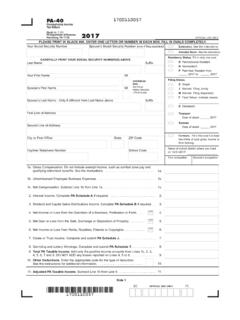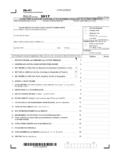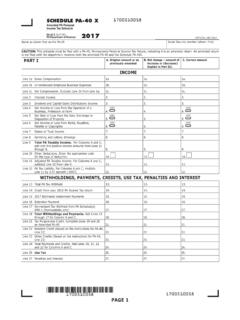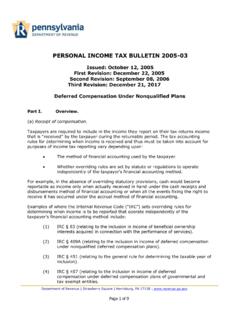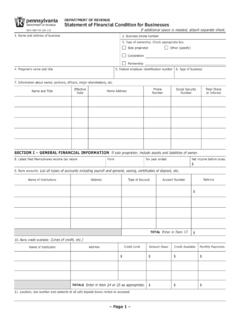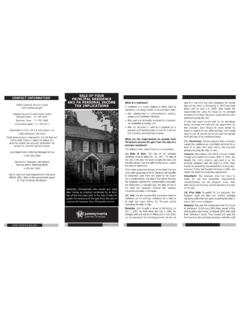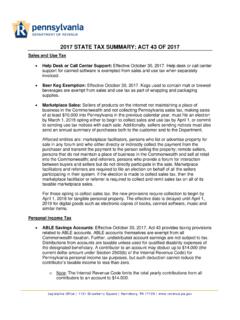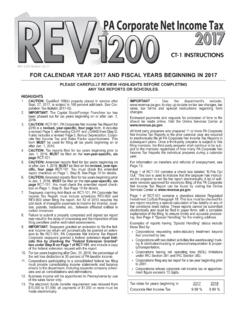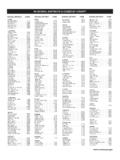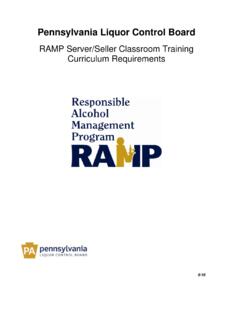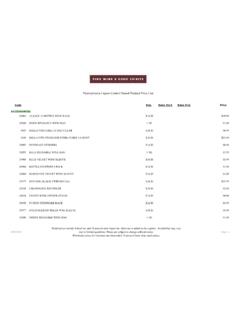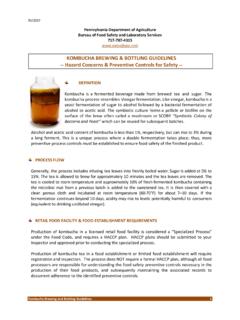Transcription of Pennsylvania Department of Revenue REV-1750
1 Department of Revenue REV-1750 Small Games of Chance OverviewREV-1750 (SU) 11-19 The Pennsylvania Department of Revenue has prepared this overview on Pennsylvania s Local Option Small Games of Chance Act, 1988 1262, No. 156, as amended, for use by the general public. This overview is for informational purposes only. Nothing contained herein should be considered legal advice. Any person or entity with legal questions regarding the Local Option Small Games of Chance Act should review the provisions of the Act for guidance or consult private legal counsel. The Pennsylvania Crimes Code provides that all forms of gambling are illegal unless the Pennsylvania Legislature specifically authorizes the gambling activity by statute.
2 Gambling exists when there is a payment of consideration or a fee or something of value for the opportunity for a prize or reward, the winner of which is determined by chance. Effectively, the three elements are: (1) consideration, (2) chance and (3) prize or reward. Currently, the only authorized and legal forms of gambling in Pennsylvania are: Those gambling activities conducted pursuant to the Race Horse Industry Reform Act. Pennsylvania Lottery (including Powerball and Mega Millions). Bingo conducted pursuant to the Bingo Law. Those gambling activities conducted pursuant to the Pennsylvania Race Horse Development and Gaming Act (Slots and Table Games).
3 Those gambling activities conducted pursuant to the Local Option Small Games of Chance Act. Those gambling activities conducted pursuant to the Sport Raffle Charities Act (SRCA). This overview discusses the gambling activities conducted pursuant to the Local Option Small Games of Chance Act. The Pennsylvania Local Option Small Games of Chance Act was passed in 1988 and has been amended several times since its enactment, most notably by Acts 2 and 184 of 2012 and Acts 90 and 92 of 2013. The small games of chance law authorizes certain non-profit organizations, known as eligible organizations (including club licensees), and for-profit taverns to conduct limited types of gambling.
4 LICENSED ELIGIBLE ORGANIZATIONS Licensed eligible organizations are authorized to conduct the following games of chance: Pull-tab games. Punchboards. Raffles (including special permit raffles). Daily drawings. Weekly drawings. Fifty-fifty (50/50) drawings. Race Night Games. Pools. Tavern Gaming Licensee Tavern gaming licensees are authorized to conduct the following types of games, known as tavern games : Pull-tab games. Tavern raffles, which are limited to once a month and must designate at least half of net Revenue to a designated charity. Tavern daily drawings.
5 Eligible Organization Licenses There are two types of licenses available to eligible organizations: A regular license and a monthly license. An eligible organization may conduct all forms of games of chance under either license type. See page 1 for the types of games of chance an eligible organization may conduct. Regular License: A regular license is an annual license, and the term runs for a calendar year from the date of issuance. The fee for an annual license is $125. Monthly License: A monthly license is valid for 30 consecutive days from the date of issuance. There is no restriction on the number of monthly licenses an eligible organization may obtain, but the licenses may not overlap.
6 The fee for a monthly license is $25. Special Raffle Permits: Special raffle permits are available to regular and monthly licensees. The special raffle permit authorizes a holder to conduct a DISCLAIMERINTRODUCTIONTYPES OF GAMESTYPES OF that exceeds the normal prize limits applicable to games of chance. As a general rule, a licensed eligible organization may obtain up to 10 special raffle permits. Total prizes awarded under all special raffle permits may not exceed $150,000. Volunteer fire, ambulance, rescue or conservation organizations may obtain up to 12 special raffle permits and award up to $250,000 in prizes.
7 For a licensed eligible organization with a regular license, the organization can receive either 10 or 12 special raffle permits during the annual license term. Because a licensed eligible organization that obtains only a monthly license does not have an annual licensed term, such organization may receive no more than 10 or 12 special permits in any calendar year. Tavern Gaming Licenses There is only one type of license available to a tavern: a tavern gaming license. Taverns that obtain a tavern gaming license from the Pennsylvania liquor control board (PLCB) are authorized to offer pull-tab games, tavern raffles and tavern daily drawings.
8 The tavern gaming license is an annual license issued and renewed by the PLCB. For additional information about the tavern gaming licensing process, visit Small games of chance law is administered and enforced by several different government entities: licensing authorities, the Department of Revenue , the PLCB, the Pennsylvania Gaming control board (PGCB) and law enforcement officials. Licensing Authorities The licensing authorities for club licensees and eligible organizations seeking to offer small games of chance are the county treasurers in each of Pennsylvania s 67 counties.
9 Where there is no county treasurer, such as in a home-rule county or city of the first class, the licensing authority is the designee of the governing body. The licensing authority is responsible for licensing eligible organizations to conduct games of chance in the commonwealth and for issuing special raffle permits. For tavern gaming, the PLCB is the licensing authority. Department of Revenue The Department is charged with several responsibilities under small games of chance law, as follows: Registration of games of chance manufacturers. Reviewing and approving pull-tab games and punchboards for use in the commonwealth.
10 Licensing of distributors to sell pull-tabs, punchboards and race night games for use in the commonwealth. Receipt and retention of games of chance reports from clubs. Random audits of 5 percent of club licensees every two years. Administration of the state and host municipality tavern games taxes. Limited regulatory authority related to manufacturer registration, distributor licensing, games of chance and games of chance records and reports. PLCB The PLCB is responsible for licensing taverns to conduct tavern games in the commonwealth, and it may also impose penalties for tavern licensees violation of small games of chance law, including suspension or revocation of tavern gaming licenses.
